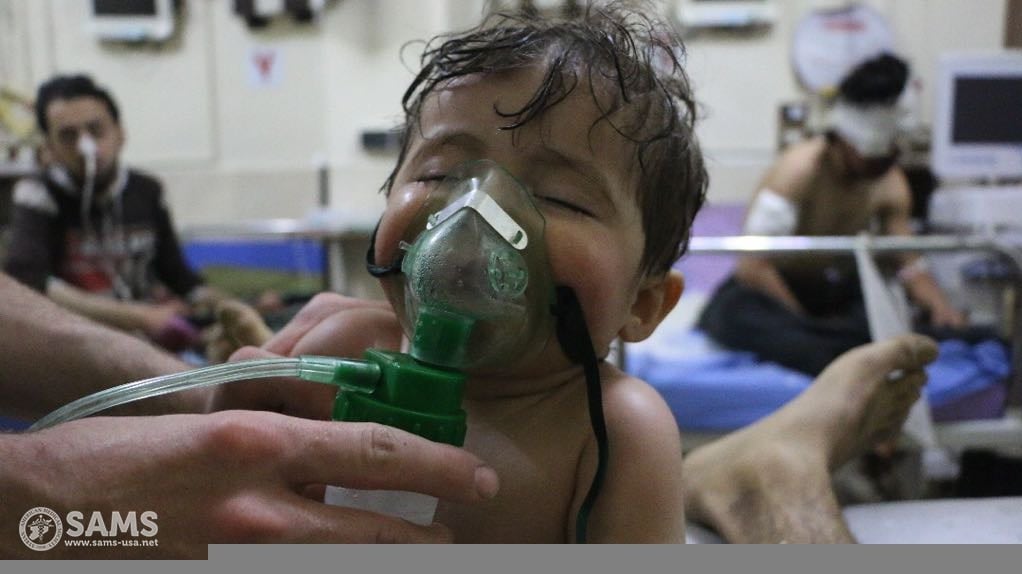President Trump is denouncing a “mindless chemical attack in Syria.” But two U.S. officials tell The Daily Beast it’s unclear whether an illegal chemical weapon was actually dropped on the Damascus suburbs—or whether the attack was yet another chlorine strike, the kind of attack that’s been routinely ignored by both the Trump and Obama administrations.
It’s a distinction that could have major international repercussions. Almost a year ago to the day, the president authorized a cruise-missile strike on a Syrian airfield after the Bashar al-Assad regime used nerve gas on its own people. But the Trump administration has done nothing in response to the dozens of reported chlorine attacks launched since then. And the administration’s departure from or continuity with the U.S.’ previous indifference, to be determined in the coming days, will determine whether Assad merely has to pick and choose which of his chemicals to use for his massacres.
While the use of any chemicals in warfare is considered illegal, only certain weapons—the nerve agents sarin, for example—are specifically monitored by international regulators. And while Assad pledged to surrender his stockpile of sarin and other chemical weapons, he made no such pledge about chlorine.
ADVERTISEMENT
The trouble is that dual-use chemicals like chlorine—those that have widespread applications for harmless use—are difficult to effectively regulate under the international chemical-weapons protocols. The Organization for the Prohibition on Chemical Weapons takes the position that “any chemical” repurposed for an attack “is considered a chemical weapon by the convention.” That focus, on a chemical’s application, puts pressure on the international community to impose consequences for a chemical’s usage in wartime—something tragically lacking in Syria since at least 2014.
All gas strikes are horrific. But the latest one, in Douma, appears to have been especially gruesome. Unverified videos and pictures out of the town of Douma show dozens of bodies piled up. “Early reports indicate at least 25 people have been killed and over 500 civilians have been injured with the numbers expected to rise. Many of the victims were children,” reported the Union of Medical Care and Relief Organizations-USA, a nonprofit supporting humanitarian efforts in Syria.
“Patients have shown signs of respiratory distress, central cyanosis, excessive oral foaming, corneal burns, and the emission of chlorine-like odor,” the Syrian American Medical Society said in a statement. “During clinical examination, medical staff observed bradycardia, wheezing and coarse bronchial sounds. One of the injured was declared dead on arrival. Other patients were treated with humidified oxygen and bronchodilators, after which their condition improved. In several cases involving more severe exposure to the chemical agents, medical staff put patients on a ventilator, including four children. Six casualties were reported at the center, one of whom was a woman who had convulsions and pinpoint pupils.”
At the moment, the evidence isn’t clear enough to say which gas was responsible for the horror. The foam from the victims’ mouths, the convulsions, and the constriction of their pupils could indicate a nerve agent. “It wouldn’t surprise me if it was sarin—the descriptions sound right,” said one U.S. official. “But gas clouds appear to have been yellow—which indicates chlorine.”
The Trump administration and its allies appear to be treating the Douma carnage as if it were a nerve gas attack. In a tweet, Trump derisively referred back to President Obama’s 2013 decision not to strike Assad for a sarin massacre (a position Trump himself advocated at the time). “The regime’s history of using chemical weapons against its own people is not in dispute,” State Department spokesperson Heather Nauert said in a statement.
Britain’s foreign secretary, Boris Johnson, gave “full support” for the Organization for the Prohibition on Chemical Weapons investigation of the Douma attack. “Russia must not yet again try to obstruct these investigations,” Johnson said on Sunday, though neither London nor Washington have yet intimated at consequences for the latest chemical barrage launched by the ascendant Assad regime.







